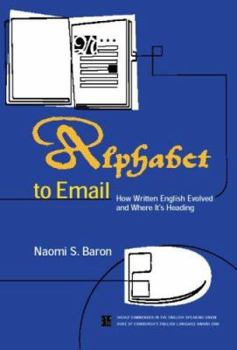Alphabet to Email: How Written English Evolved and Where It's Heading
Select Format
Select Condition 
Book Overview
In Alphabet to Email Naomi Baron takes us on a fascinating and often entertaining journey through the history of the English language, showing how technology - especially email - is gradually stripping language of its formality.
Drawing together strands of thinking about writing, speech, pedagogy, technology, and globalization, Naomi Baron explores the ever-changing relationship between speech and writing and considers the implications of current...
Format:Paperback
Language:English
ISBN:0415186862
ISBN13:9780415186865
Release Date:April 2001
Publisher:Routledge
Length:336 Pages
Weight:1.15 lbs.
Dimensions:0.8" x 6.2" x 9.2"
Customer Reviews
4 ratings
good to read
Published by Thriftbooks.com User , 20 years ago
baron book is a nice book to read about the written of email and alphabet,but i have not read everything thing about it that is why i want to review it on internet.
Very interesting
Published by Thriftbooks.com User , 22 years ago
Baron bases her book on the timeline of literacy. She begins early in the year 1150 and touches on the story of Robin Hood. Robin Hood was unable to write to his love because he simply did not know how. Baron next back tracks into B.C. and explains how the Greeks were the first people to have an Alphabet. Baron jumps forth in time to about 1400 BC when Munks were writing by hand day in and out to write books. In 1445, Gutenburg produced the first mass produced bible. Baron goes on to talk of the paper types and such and continues to follow down the timeline of literacy. When she reaches near the end of the time line, she brings in the telegraph, then the telephone, and last email. She explains how our social etiquette has changed in literacy. She ends her book with email and where it will lead us to next.There is a great purpose to this book. Baron's purpose of her book is to teach her readers about language and literature and the history of language and literature. There is quote on the back of her book by Publishers Weekly stating, "...Baron's book examines the cultural, political, religious, and technological influences on written language as compared with spoken language."
eternally evolving language
Published by Thriftbooks.com User , 22 years ago
Baron's purpose for writing this book consists of informing the audience of how language came about, how it has changed as new technologies came around, and how it is still changing. First she talks about where the written language first came from, and then she gets more specific and discusses how English evolved. Next she covers who reads and why they read throughout the timeline. She also talks about written standards and how language is exchanged over distance and time. She also has a whole section that is devoted to email. This book is well written with language that is easily understandable. It is interesting with good example and explanations throughout. It is more of a slower reading book to be able to soak up the information.
Fascinating book for a general audience
Published by Thriftbooks.com User , 24 years ago
Every communications technology has significantly affected the nature of human language. With the growing ubiquity of the Internet, this is an appropriate time to take a look at the effect of technological change on language and to see if historical patterns repeat themselves in the virtual world.I am personally fascinated by languages. I'm amazed by the richness and variety of human communication, and by the constant change in vocabulary, grammar and style. In comparison to other languages, written English is pretty close to spoken English-even parts of this review uses language similar to what I might use in an intellectual conversation about a book on linguistics. Still, I thought that I'd give Baron a chance, and see what she had to say. I'm glad that I did.This is not a book for academics. It is written for the educated and somewhat motivated layperson. With a glib style, and a keen awareness of the need to explain linguistic concepts to her readers, Baron's book is informative and enjoyable. According to the author, written English was once virtually identical to speech, serving as a record of spoken words. As needs changed, and technology permitted, language patterns in written English diverged significantly from spoken English. However, and perhaps motivated by the requirements and capabilities of new transportation and telecommunications technologies, written English has made a decisive retreat from the formal, and appears to be reconverging towards spoken language patterns.She paints a dynamic picture of the historical ballet of written English. The give and take as the prescriptivists (think William Safire) and the descriptivists each have their day. Since the 1960s, American dictionaries have been largely descriptive, no longer trying to impose the ideals of their editors on the language, but instead trying to provide a written reference to actual usage (this is why contemporary dictionaries include profanities).Not being a big fan of anything written before the late 19th century, I can easily accept that written language has become less formal. For me, Mark Twain was one of the earliest writers to use a style that doesn't feel horribly anachronistic. Interestingly enough, Twain was the first author to provide his publisher with a typewritten book manuscript. Baron makes a compelling case for the influence of technology, like the typewriter, on the English language. Again and again, the significance of new communications technologies is often completely misunderstood. Conservative social elements resist new technologies out of concern for their perceived negative effect on cultural values. Perhaps justifying this natural social backlash, once a communications technology becomes commonplace, it results in permanent changes on written and spoken language.So what will be the effect of the Internet on our mother tongue? I wouldn't spoil a good story by leaking the ending, but I can tell you that her conclusions are w






